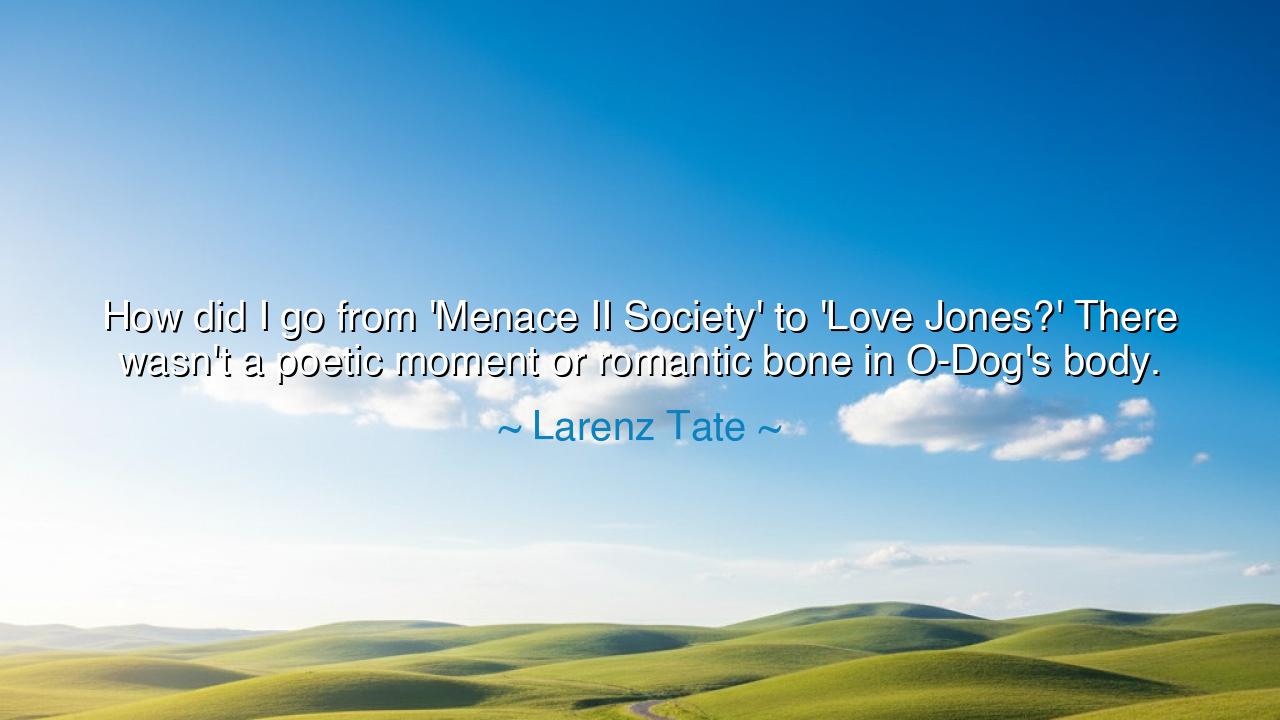
How did I go from 'Menace II Society' to 'Love Jones?' There
How did I go from 'Menace II Society' to 'Love Jones?' There wasn't a poetic moment or romantic bone in O-Dog's body.






"How did I go from 'Menace II Society' to 'Love Jones?' There wasn't a poetic moment or romantic bone in O-Dog's body." These words, spoken by Larenz Tate, reflect a profound and transformative journey—a shift from the hard-edged, violent world of O-Dog, a character in the film Menace II Society, to the sensitive and romantic role of Darius Lovehall in Love Jones. Tate’s reflection on this transition is more than an observation about two roles; it is a deeper commentary on the flexibility and complexity of the human soul, and how even the most seemingly hardened individuals can evolve, transcending their initial circumstances to embody new dimensions of love and poetry. It is a reminder of the transformative power of identity and choice, and how one can evolve beyond what society expects of them.
In the ancient world, there was a deep understanding that identity was fluid, not fixed, and that individuals were capable of great transformation. The great hero Odysseus, for example, was not merely the warrior who fought at Troy, but also a man of wisdom, cunning, and emotion, navigating countless challenges and internal struggles to return home. His journey was not just a physical one, but a moral and emotional evolution, shaped by the choices he made. Like Tate’s transition from O-Dog to Darius, Odysseus represented the potential within all men to evolve, to embrace new roles, and to transcend their earlier limitations. In this sense, Tate’s reflection is a modern expression of an age-old truth: we are not defined by one moment, one role, or one identity, but by our capacity for change and the choices we make.
Tate’s shift from playing a character like O-Dog, who is defined by violence, anger, and fear, to the romantic and introspective Darius Lovehall in Love Jones, is emblematic of the transformative power of empathy and self-awareness. The character of O-Dog is a product of his environment—angry, distrustful, and emotionally closed off. But Darius is a man capable of vulnerability, who seeks understanding and connection. It is not that the traits of violence and fear that defined O-Dog are inherently absent from Darius, but rather that Darius chooses a different path—a path that opens him to the beauty and complexities of love. This transformation, from hardness to softness, from disconnection to connection, reflects an essential truth of the human experience: we are never solely defined by our past actions, but always possess the capacity to evolve and change.
Take, for example, the story of Gaius Octavius, who became the great Roman Emperor Augustus. Born into a turbulent period of Roman history, young Octavian was thrust into a world of political and military strife. But as he matured, he reinvented himself—not just as a warrior, but as a statesman and a unifier, shaping an empire that would endure for centuries. Augustus did not let his past, marked by bloodshed and political rivalry, define his future. His capacity to transform into a ruler who sought peace and prosperity for his people reflects the same possibility for reinvention that Tate speaks of—where one can evolve into something greater, more profound, and more empathetic, regardless of the initial circumstances.
Tate’s question—"How did I go from O-Dog to Darius?"—captures the essence of the human journey. It reflects a doubt, a wonder at how an individual can evolve from a place of rage and fear to one of poetry and love. It speaks to the power of self-reflection, where an individual is able to look beyond their present self and imagine a different version of who they can become. The transformation that Tate underwent, shifting from a character who embodied aggression and disillusionment to one who embraced tenderness and love, mirrors the inner journey that many go through in their own lives. It is a quest not only for personal growth, but for the redemption of one’s past, for the reconciliation of the inner contradictions that we all carry.
The lesson here is clear: the capacity to evolve is not just a potential, but a responsibility that each person carries. To allow ourselves to transcend our circumstances and the roles that society might place upon us is a heroic endeavor. Just as Odysseus grew and changed through his trials, or Augustus redefined his future, we, too, have the power to shape our identities, our roles, and our destinies. It is not our past actions, or even the roles we are initially cast into, that define us, but the choices we make every day to transform and evolve.
In our own lives, let us take inspiration from Larenz Tate’s journey—from O-Dog to Darius. It is a reminder that we do not have to remain confined by past mistakes or labels. Change is always possible, and through it, we can access parts of ourselves that are more vulnerable, loving, and authentic. Let us ask ourselves: in what ways can we redefine who we are, shedding old skins of anger, fear, or despair, and stepping into roles that allow us to love more freely, live more fully, and be more true to our highest self? The path to transformation is not easy, but it is through this personal evolution that we find our greatest potential.






AAdministratorAdministrator
Welcome, honored guests. Please leave a comment, we will respond soon